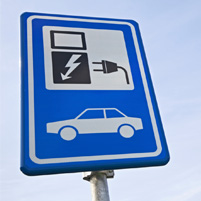Plugged In to Sustainability

Anyone that owns a car today has an eye on the roller-coaster price of gasoline. Scott Peterson wants to help.
For the past three years, the engineering and public policy (EPP) doctoral student has focused his research on plug-in hybrid electric vehicles (PHEVs). As the name implies, PHEVs are hybrids with batteries that can be recharged through connection to an external power source.
In the lab, Peterson studies issues ranging from battery degradation to how widespread PHEV use would affect the electric grid. Important questions include the net impact on pollutants, as well as the additional load and timing of charging the vehicles.
"I researched a number of energy sources for transportation (biofuels, hydrogen, etc) and came to the conclusion that directly using electricity was one of the ways that offered the most flexibility to society," explained Peterson. "The implications [of my research] are that PHEVs will be more realistic than previously thought — and electricity is a much more price-stable source of energy that can be generated from a wide variety of sources."
Dedicated to making a difference, he specifically chose Carnegie Mellon and EPP.
"I wanted to work on energy and sustainability issues," Peterson said, "And EPP at CMU was one of the best places in the country to do that."
He added, "I came to realize that even the best ideas are not enough. Oftentimes it's important that policy is formulated to help innovation proceed. EPP offers an environment in which a student can do research focusing on anything from minute details in a laboratory to policy research. That flexibility is the key feature that sets EPP apart."
Peterson's work has garnered attention. He was a 2009-2010 recipient of the Philip and Marsha Dowd Engineering Seed Fund Fellowship, a fund established by the Dowds in 2001 to provide support for cutting-edge graduate research.
"The Dowd-ICES fellowship allowed me to continue [my research], which means more robust results and less prediction and interpolation," Peterson said. "When the results of such work are published it's much more likely that further research on the same track will be supported."
And the Carnegie Mellon environment turned out to be just what he'd hoped for.
"The professors are all experienced and have invaluable advice to give," noted Peterson. "My colleagues are all exceptional."
Related Links: Peterson's Research | Dowd-ICES Fellowship | Engineering & Public Policy
